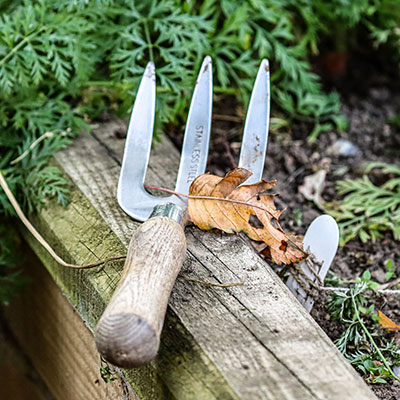
Any outdoor work is far easier with good tools. Purchasing the highest quality tools you can afford is generally a rule of thumb when it comes to gardening and outdoor work. Quality garden tools pay for themselves over time since they will have to be replaced less often and will also lessen the time required to complete your task.
Good garden tools are not cheap, so you want to keep your tools in the best possible condition. Fortunately tool maintenance is fairly quick and easy and doesn’t cost you much at all, especially in comparison to the cost of buying a new set.
Basic Maintenance Kit
Have handy the supplies you need to keep your garden tools in good shape. The list is fairly short:
- Linseed oil
- A general purpose oil like 3-in-1
- A stiff wire brush
- Cleaning rags
- Sandpaper
- Sharpening stone
Avoiding rust
Some people feel the only way to avoid rust is to buy stainless steel tools, which are more expensive than high carbon steel tools. Practicing simple maintenance will prevent rust just as well and with less expense.
- Clean off excess dirt
After a long day in the garden, most people just want to put their tools away and go inside. Take a few minutes and hose the dirt and grime off your tools. Keeping a wire brush near the hose makes it easy to loosen the dirt or mud. - Oil the tools after use
Keep a rag soaked with linseed oil or paraffin handy and give the tools a quick once over before putting them away. Some gardeners recommend keeping a bucket of sand and motor oil in tool shed and dipping the tools in the mixture before putting them away. While this does prevent rust, motor oil is not something that is recommended for your soil and is harmful to the environment. For garden shears, a few drops of 3-in-1 oil keeps them rust free and in perfect working condition. - Don’t leave the tools on the floor
Even tool sheds with floors do not completely protect your tools from moisture. Hang them from hooks on the walls of the shed for the best protection. Hand tools like shears should be stored on a table.
If you already have rust, take the time to remove it. A scouring pad or wire brush will usually do the job. Once you have removed the rust, oil the tool thoroughly.
Wooden Handles
When buying tools with wooden handles, be sure to select those that are less prone to splintering like oak and hickory. Before using them for the first time you should treat them with linseed oil. Simply put the oil on a cloth and rub into the wood, let the wood absorb the first coat and apply another coat.
Older handles will benefit from an application of oil as well. Simply use a stiff brush to remove as much dirt as possible before applying the oil. Avoid soaking the handle with water to clean it as the wood will absorb some of the water and may cause the handle to swell.
Knives, Shears and Secateurs
Sap and other plant residue will quickly dull the blades of secateurs, knives and shears. Treat them like silverware and wash after every use and then apply a couple drops of all-purpose oil at the pivot point. A penetrating oil, like 3-in-1 works better than the lubricating oil that comes in an aerosol can. Always store these items with the blades closed or in a sheath. If the blades do become dull you can sharpen them with a sharpening stone. Finally, routinely check and tighten the tension bolt on shears.
Power Tools
While power tools like mowers, weed-eaters, and electric clippers don’t require the same level of maintenance as your car, you want to check the oil level and air filters regularly in addition to keeping them generally clean. It’s a good idea to have mowers serviced before the start of a new season as well, which is also a good time to repair or replace broken or damaged items so you can start the New Year off properly. Using broken tools is not only frustrating; it can also be dangerous. For example, bent fork prongs can be straightened by sliding a hollow metal tube over the tine and pulling the prong into position, which decreases the chance of snapping the prong off, or suffering a nasty injury. You can keep the blade of shovels and hoes sharp with either a fine metal file or a sharpening stone to make sure that you put minimal effort into digging, helping reduce strain on your body. Cracked or damaged wooden handles should always be replaced immediately. Stick with oak or hickory handles, which are easily found at your local garden centre. These handles are less likely to splinter or break, which means you will be able to use them for longer and they should not cause you any discomfort when you use them.





